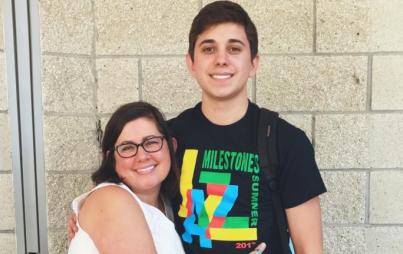
Without comprehensive sex education, kids today are “educating” one another just like we did when we were teens. They’re “studying” in their bedrooms, behind closed doors or when their guardians are at work. They’re “cramming for the practical exam” in the woods in parked cars.
Late last week a judge in California ruled abstinence-based sex ed illegal. Abstinence-only programs are in violation of California law, the Fresno County Superior Court judge said, because they promote “medically inaccurate information.” He described access to medically and socially appropriate sexual education as “an important public right.”
People are describing the decision as “historic” and calling this judge a “hero.” If ever there was any question that kids need comprehensive sex ed, a chlamydia freakout at an abstinence-only high school in Texas might have laid such doubts to rest. And yet — beyond this victory in California, May was not a win for lovers of evidence-based thinking.
The month started with a bill that would require sex education be taught in New Orleans public high schools failing in the Louisiana House. Around this same time, Northwestern Medical Ethics professor Alice Dreger took to Twitter to express her outrage and disgust at the anti-sex education her son was receiving (she was subsequently told by the administration that she was no longer welcome on school property). Then in Ontario, thousands of parents pulled their kids out of school in protest of a new sex ed curriculum coming this fall.
I think — I mean, I hope — we all agree that sexual health is important. Certainly, no one (by definition) wants unwanted pregnancies, and sexually transmitted infections are also not very fun. What we all still don’t seem to agree on is how to prevent these things, even though that’s a question that evidence-based research has already answered.
The California judge is right: Abstinence-based sex ed doesn’t work. Back in 2009, an undergraduate student put together this damning indictment against abstinence-based sex education, which is the statistically most common form of education kids receive in North America. Abstinence programs are popular, the report reminds us, due to the fact that here in the States such curriculums are federally-funded. To receive money from federal programs such as Title V, Community-Based Abstinence Education and the Adolescent Family Life Act — three primary funding streams that support school-based sex ed — the curriculum must adhere to strict and restrictive standards. For example, educators must teach kids that abstinence is the only way to avoid sexually transmitted infections, pregnancy, and psychological harm, and discourage kids from having sex outside of marriage. Methods of contraception, such as condoms or the birth control pill, are only allowed to be brought up when emphasizing failure rates and ineffectiveness.
As a result of all this “education,” the report says, Americans are having sex at a younger age, and using less effective contraception or none at all. Our teens have higher rates of pregnancy and abortion than any European country, and rates of curable STIs are higher in the US than any other industrialized country and even some developing countries.
Like the “debate” over climate change, there isn’t really a debate. There are facts, and they are easy to find. And yet, there are parents who still think the path to sexual health is by promoting celibacy before marriage and not mentioning contraceptions— parents who really believe their special snowflake will happily abstain from sex until they meet and marry “the one,” in a society where 97% of people don’t.
Without comprehensive sex education, kids today are “educating” one another just like we did when we were teens. They’re “studying” in their bedrooms, behind closed doors or when their guardians are at work. They’re “cramming for the practical exam” in the woods in parked cars.
They’re also being educated by our sex-soaked media. According to concerned researchers, the average kid spends just under seven hours a day interacting with the media— we’re talking TV, video games, the Internet, etc. We know as media consumers ourselves that a lot of what they’re watching is sexually-charged content. This is not a call for censorship — rather, it’s a call for adults to start having meaningful conversations with their kids. If parents don’t have the facts themselves about sex — and how could they, having grown up without comprehensive sexual education themselves? — they need to let doctors and (educated) educators do it.
Teaching sex ed the right way doesn’t have to be weird or hard.
Just as there’s evidence that abstinence-based sex ed doesn’t work, we also have plenty of models demonstrating how successful sex education curriculums can look. The Dutch, for example, begin conversations about sex and the body with children as young as four years old. It’s probably no coincidence that their country boasts one of the lowest pregnancy rates among teenage girls in all of Europe. NY Times Magazine recently highlighted a new approach to sex ed that uses openness and humor. Other research suggests that what young people really want is more information about the psycho-social aspects of sexual health. Experts from both sides of the ‘debate’ agree that sex ed should focus on relationships, rather than the act and that we ought to talk to kids not just about sex, but of love. I’m all for that, just so long as we’re also still willing to admit that some kids are finger banging or trading blow jobs not out of love but for “like.”
A comprehensive sexual education protects an individual’s ability to make informed, responsible decisions about one’s sexual health, and yet, many lawmakers are reticent to allow even abstinence-based programming in their districts’ schools. The Louisiana bill that failed, for example, described itself as “comprehensive, age and developmentally appropriate, medically accurate and evidence-based instruction” but would not have gone so far as to teach a young person how to use a condom. Sure, this Fresno judge has the right idea — but his decision applies only to the 40,000-student Clovis Unified School District. Parents and lawmakers everywhere else: smarten up! As one proponent of the failed Louisiana bill said, “Your kid is going to learn it whether you like it or not.”








